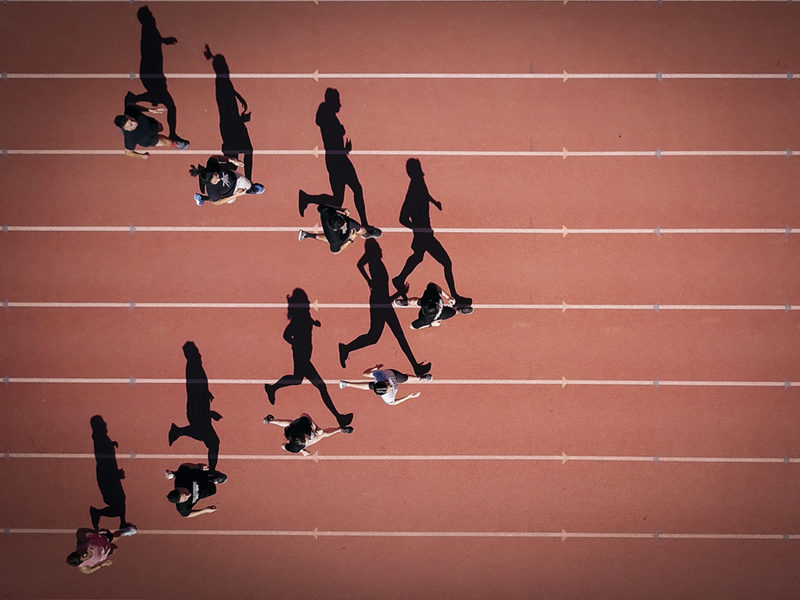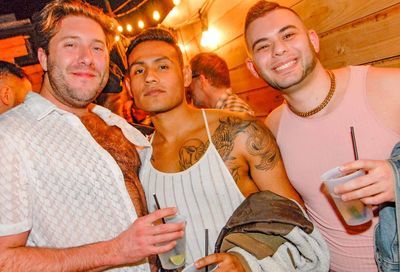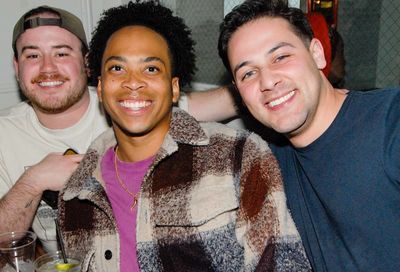Athletes, coaches call on NCAA to remove championships from states with anti-trans athlete laws
Advocates say the collegiate sports association needs to move beyond its tepid response to bills targeting student-athletes.

Current and former NCAA athletes and players and coaches from the WNBA are calling on the NCAA to abide by its own policy and yank college sporting championships from states that have passed laws barring transgender student-athletes from competing based on their gender identity.
Speaking during a Friday press call co-hosted by the Human Rights Campaign, Athlete Ally, and the Minnesota-based advocacy group Gender Justice, the coaches and athletes urged the collegiate sports association to move beyond the tepid response offered by NCAA President Mark Emmert when asked to denounce nearly 50 pieces of legislation targeting transgender athletes that are circulating in more than two dozen states.
“Transgender inclusion is so crucial for the health, safety and well-being of transgender kids who are already at a higher risk of anxiety, depression and dysmorphia, suicide. And some transgendered kids say that playing sports helped to save their lives,” said Napheesa Collier, a forward for the WNBA’s Minnesota Lynx. “The NCAA has to take action and withdraw all athletic competition from states considering harmful and anti transgender sports bills.”
Cheryl Reeve, the general manager and head coach of the Lynx, disputed the notion on which the anti-trans sports bills are based.
“I’m here today to to to talk about this notion that somehow these legislators are concerned about protecting women’s sports. I’ve been involved in women’s sports for a long, long time, since the ’70s when the Title IX legislation passed, and what I’m here to tell you is that what’s really harming women’s sports is an overall lack of investment, whether in resources for female athletes, opportunities to coach in the profession, and lack of pay,” Reeve said. “Those are the true threats to women’s sports. And this starts from scholastic competition all the way through to the WNBA and professional sports.
“Additionally, the notion that the motivation of transgender athletes is to gain scholarships or a competitive advantage is simply a false narrative,” she added. “When I travel across the world to find championship-level players, it is so much more than some sort of physical attribute. I can tell you this: when I am vetting a player, skill for the game of basketball is so much more important. Look at every one of our championship teams. We were never the most athletic team. What we have is what’s on the inside. Championship teams are built from players that have this internal drive and motivation.”
In response to a letter from the Human Rights Campaign inquiring about the NCAA’s position on the anti-trans athlete bills in various legislatures, Emmert reiterated the NCAA’s previous statements that it takes into account whether potential host cities have laws hostile to the LGBTQ community when deciding which cities or states get to host championship games.
He posited that championship games should be held in locations without harmful or restrictive laws, saying the NCAA remains “concerned” over the proliferation of trans athlete bans. However, he declined to take specific, direct action against states with such laws, saying only that the NCAA would “monitor” the situation.
But Alphonso David, the president of the Human Rights Campaign, said words aren’t enough, pointing to the brazen way in which states such as Tennessee, Mississippi, and Arkansas have flouted their attempts to bar transgender athletes from competing, perhaps assuming they will not be punished. Even South Dakota Gov. Kristi Noem (R), in recent comments, speculated that if enough states passed trans athlete bans, the NCAA would be powerless to take action against all of them.
“This is a moment of national crisis where the rights and the very existence of transgender young people are under attack. This year’s state legislative session marks the highest number of anti-transgender bills in history, more than 50 of which target the ability of transgender athletes to participate in sports,” David said, warning that additional bans are poised to pass in states like Montana, Alabama, West Virginia, and Kansas.
“We are asking the NCAA to do more and to use the power of their visibility to reaffirm and support transgender and non binary athletes across the nation,” David added. “We certainly appreciate the affirmation they have taken in the past, but we’re asking them in this defining moment, we need them to help all of us live into our collective values, ensure that, and show all of us that we’re showing up for young people.”
See also: South Dakota governor signs anti-trans executive orders after ban on trans athletes fails
Critics of NCAA note that it is would not be without precedent for the NCAA to take action against states seeking to host collegiate sports championships. In 2016, following passage of North Carolina’s infamous and controversial HB 2 — known colloquially as the “bathroom bill” — barring transgender people from using multi-user facilities matching their gender identity in publicly-owned or -operated buildings, the NCAA yanked seven sports championships from the Tar Heel State.
Recently, hundreds of NCAA student-athletes signed onto a letter calling on the NCAA’s Board of Governors to comply with the organization’s own nondiscrimination policy and hold championships and tournaments only in states that promote LGBTQ inclusion. The two students who began circulating the letter, Washington University in St. Louis track-and-field stars Aliya Schenck, 20, and Alana Bojar, 21, were also on Friday’s press call.
Bojar said she and Schenck felt compelled to speak up after what they saw as the NCAA’s failure to speak out sooner against the anti-trans athlete bills, contrary to the NCAA’s previously stated commitment to promoting LGBTQ inclusion in sports.
She also noted that the bills that are passing in various states cannot be enforced without targeting athletes — the overwhelming number of whom will be cisgender female athletes — for discrimination based on any perceived deviation from gender stereotypes, no matter how slight.
“It’s impossible for woman athletes to feel safe and supported in an environment where their personal identity and integrity is questioned,” Bojar said. “The reality is, many of these bills cannot possibly be enforced without inviting policing and bullying of all student-athletes who do not meet stereotypes of gender, and could empower any person to force any student-athlete to undergo invasive physical exams or hormone tests in order to ‘prove’ their gender, whatever that means.

‘Trans women don’t threaten women and girls sports,” she concluded. “They’re my teammates who want to play for the exact same reasons I do: to have fun, to improve ourselves, to make friends, and be physically fit.”
“Trans girls are girls. Trans kids are kids. They’re not a threat to women’s sports. And we’re proud to call them our teammates,” added Schenck. “At WashU on the track team, we have a saying that ‘Our team is our family,’ and we support each other and protect each other and love each other no matter what. Trans girls have been competing for a long time, without incident. And so the NCAA needs to take action and withdraw all athletic competition from states considering anti-transgender sports bills.”
CeCé Telfer, a trans woman and former NCAA Division II track champion, said she appreciated how the NCAA treated her as a trans athlete when she was competing, but believes the organization can do more to speak up for athletes like her.
“As a trans athlete, first of all, I am not a threat to women’s sports because I am a woman. The joy and beauty of finally embracing myself and being in a sport that I love and being on that line with the women I’m supposed to be with, it’s enlightening,” she said. “Athletics is a way for people to get out and get away from the negativity and just breathe. And I really think the NCAA can do more.”
Annie Lieberman, the director of policy and programs at Athlete Ally, said that failure on the NCAA’s part to act or address the problem should be interpreted as condoning discrimination and breaking their own promise to ensure NCAA sporting events are inclusive of all.
“Every day the leadership of the NCAA stays silent, these hateful bills gain momentum,” Lieberman said. “The time has passed for simply monitoring the situation. If you say nothing, even though you have clear policies and practices that support inclusion of trans student athletes, you are implicitly supporting these bills.
“Transgender students participate in sports for the same reasons as anyone else: for the physical and mental health benefits, the invaluable lessons of teamwork and self discipline, the lifelong friendships, and, honestly, just to have fun,” Erin May Quade, the advocacy director for Gender Justice, said. “Like kids everywhere, transgender kids thrive when they are treated with dignity and respect. Being a kid is hard enough. We don’t need politicians making it even harder for kids who are transgender and singling them out for increased bullying and harassment. We need champions for all kids–individuals and institutions, including the NCAA.”
Read more:
Trans woman files for emergency injunction to stop Georgia prison officials’ retaliation against her
Tucker Carlson claims trans people threaten “perpetuation of the species”
Support Metro Weekly’s Journalism
These are challenging times for news organizations. And yet it’s crucial we stay active and provide vital resources and information to both our local readers and the world. So won’t you please take a moment and consider supporting Metro Weekly with a membership? For as little as $5 a month, you can help ensure Metro Weekly magazine and MetroWeekly.com remain free, viable resources as we provide the best, most diverse, culturally-resonant LGBTQ coverage in both the D.C. region and around the world. Memberships come with exclusive perks and discounts, your own personal digital delivery of each week’s magazine (and an archive), access to our Member's Lounge when it launches this fall, and exclusive members-only items like Metro Weekly Membership Mugs and Tote Bags! Check out all our membership levels here and please join us today!


























